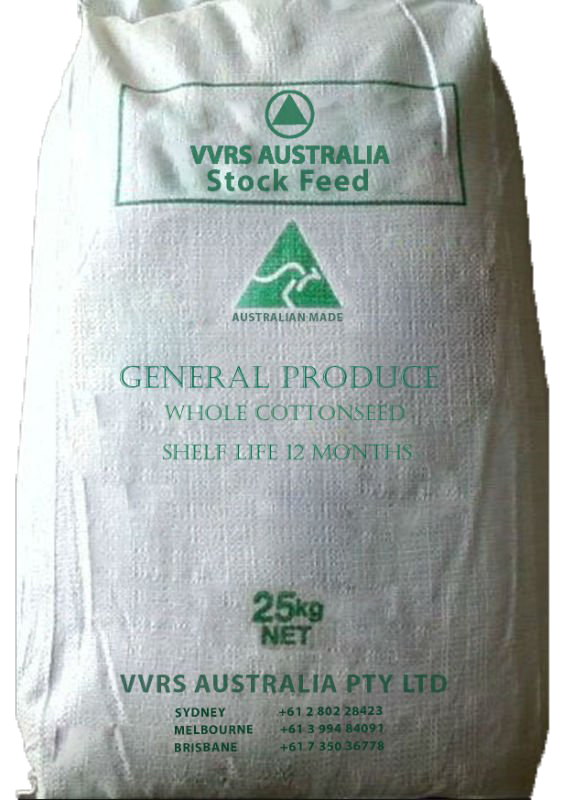BRISBANE: +61 7 350 36778 MELBOURNE : +61 3 994 84091 SYDNEY: +61 2 802 28423

PRODUCT DESCRIPTION
Whole cottonseed is the seed produced as a by-product of the cotton ginning process. Whole cottonseed can be used as a supplement for ruminants or alternatively for cottonseed meal and oil production.
Whole cottonseed is high in fat, protein and fibre and can be fed to cattle, sheep and other ruminants. The seed can be fed as a supplement to dry standing pasture or as an ingredient in feedlot rations.
The digestion of whole cottonseed in the rumen causes a slow release of nutrients. With the slow release of nutrients, a component of protein is bypass protein. This bypass protein will be available for direct absorption by the animal.
As the seed contains little starch and the fat provides the energy, there is no risk of acidosis or grain poisoning.
Whole cottonseed contains the plant pigment, gossypol. The free form of gossypol is toxic to animals. Cattle, sheep and other ruminants are able to detoxify the free gossypol, up to a certain level. Whole cottonseed typically contains between 0.6% – 1.6% free gossypol. See M. Evans (1985) for more information.
DIRECTIONS FOR USE
The amount to feed is limited by:
- the potential risk from chemical residues
- fat intakes and its negative effect on the rumen
- risks of gossypol toxicity
• The level of free gossypol is potentially harmful to animalsat certain stages and feeding should be limited to the maximum levels listed in the suggested feeding rates table.
• It has been reported that the free gossypol from feeding whole cottonseed can lower semen quality in bulls. It is not clear if there is any effect on conception rates in paddock matings and libido.
• Whole cottonseed can be fed out in troughs or placed directly on the ground.
• Whole cottonseed can be fed directly to the stock or mixed with grain, molasses or other feedstuffs.
• Whole cottonseed can be fed whole, without any processing or grinding.
• Whole cottonseed can be fed out daily or every second day to twice weekly to reduce workload.Twice weekly feeding means offering 3 or 4 days quantities of feed, every 3 or 4 days.
TYPICAL NUTRITIONAL ANALYSIS
| PROTEIN | % | : | 21.00 |
| CALCIUM | % | : | 0.14 |
| PHOSPHORUS | % | : | 0.60 |
| FAT/EE | % | : | 17.00 |
| CRUDE FIBRE | % | : | 24.00 |
| ME RUMINANT | MJ/kg | : | 13.00 |
| ACID DETERGENT FIBRE | % | : | 30.00 |
| NEUTRAL DETERGENT FIBRE | % | : | 40.00 |
SUGGESTED MAXIMUM INCLUSION RATESIN A TOTAL RATION
Monitor stock performance and adjust feeding rates accordingly.
WARNING
Due to the inability to detoxify the free forms of gossypol and the presence of high levels of fibre, whole cottonseed should not be fed to pigs, poultry and horses.